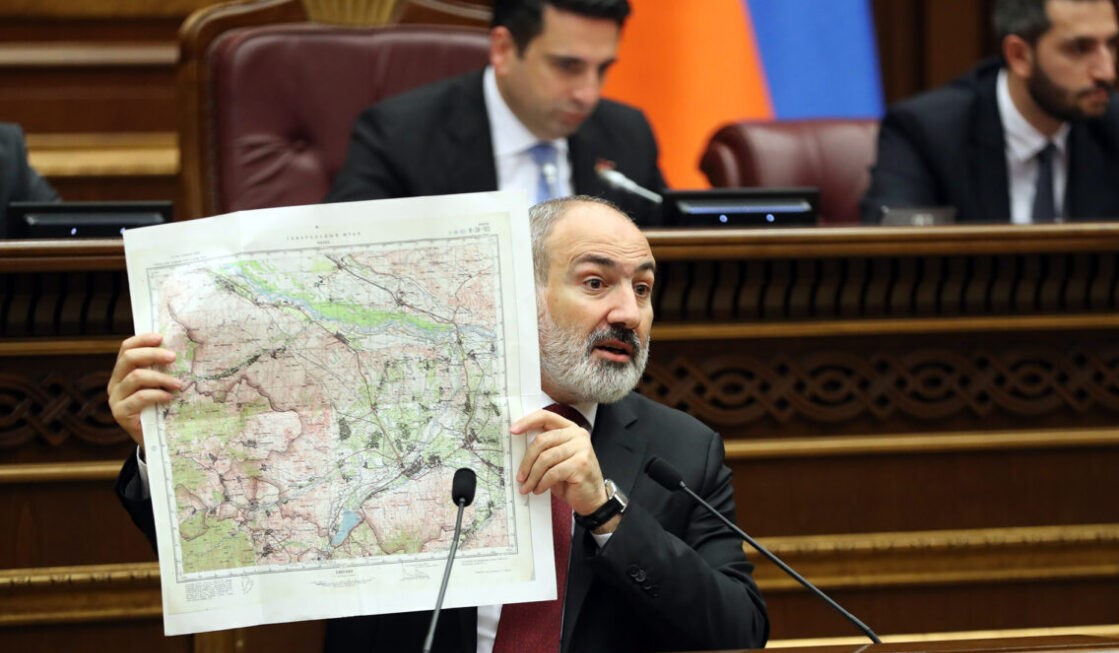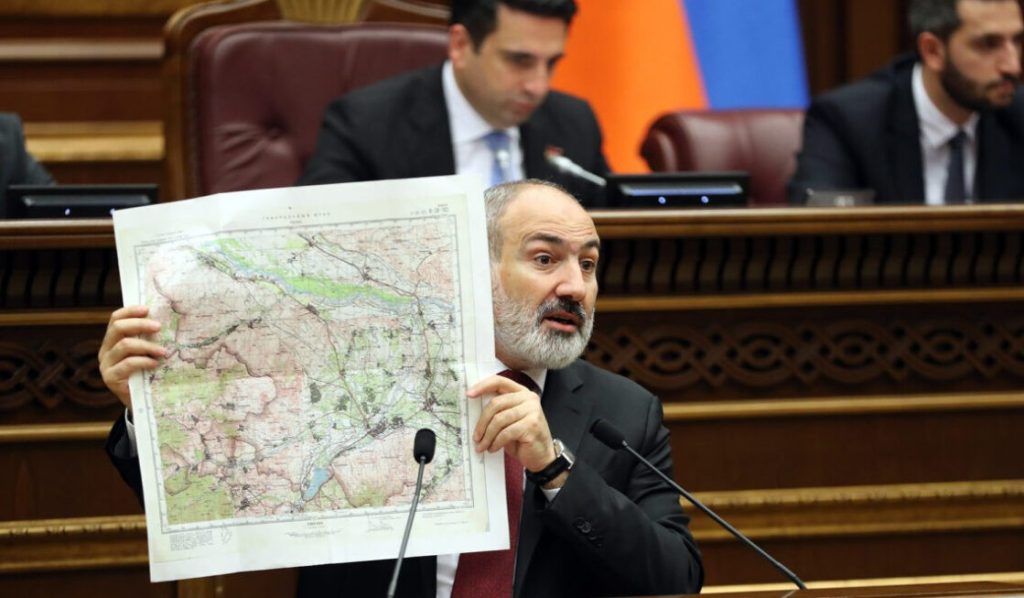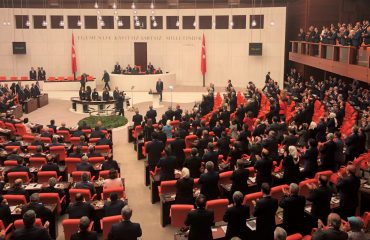

Armenian PM Nikol Pashinyan holds a map of Armenia in his address to the Parliament on May 22 as proof that his government did not compromise “a millimeter” of its internationally recognized borders. (Photo: Armradio.am/ Stepan Poghosyan)
Yesterday, on May 26, Azerbaijani flags were hoisted on 4 border villages from which Armenia had withdrawn as a result of the agreements. This condition was Azerbaijani President İlham Aliyev’s red line for reaching a deal with Armenia; he even declared that it could be an act of war. Armenian Prime Minister Nikol Pashinyan, on the other hand, had made it clear that he did not want to go to another war with Azerbaijan for this reason. The 4 villages were also designated Azerbaijani territory in the Soviet Union-era border demarcation in 1969.
When Pashinyan responded to criticism in the Armenian parliament on May 22 that he had sold his homeland to Azerbaijan, he cited a map of the USSR from 1976, drawn based on the 1969 agreement: Not a millimeter of the borders of the Republic of Armenia had been compromised. “We should consider this a success,” Pashinyan said, “for the first time in history we are determining our borders through independent negotiations.” The agreement between Azerbaijan and Armenia was fine-tuned by their foreign ministers, Ceyhun Bayramov and Ararat Mirzoyan, on May 10-11 in Kazakhstan.
“Emotional ties with the past”
Before the Kazakhstan meeting, Pashinyan had responded to similar questions on May 7, saying that Armenia had not compromised an inch of its 29,743 square kilometers (*) of territory by agreeing to withdraw from villages officially belonging to Azerbaijan. The questions stemmed from statements he made on April 10, also in his speech in the parliament, which sparked controversy in Armenia and the Armenian diaspora.
Pashinyan had said the following:
– “My government and I have concluded that historical Armenia and real Armenia are not only not compatible but are often at odds with each other and even create serious threats for each other. (…) Armenians must free themselves from the emotional ties of historical Armenia and focus on the current, real Armenia.
– “These emotional ties to the past guarantee that Armenians will never be truly independent and will always be in search of ‘external supporters and saviors.’ (…) This also contributes to our continued enmity with several countries and justifies their aggressive policies towards us.”
Not so hard to decrypt
Continuous “foreign support” implies the United States, Russia, and France, depending on the situation.
Until the Second Karabakh War of 2020, when Azerbaijan (with Türkiye’s support) reclaimed its territories that had been under occupation since 1993, the influence of these countries on Armenia’s policies may have been greater than that of Armenian politicians.
In this process, a positive Western twist came from Germany, where Chancellor Olaf Scholz arranged a meeting between Pashinyan and Aliyev at the Munich Security Conference on February 17. On his return, Aliyev met with President Tayyip Erdoğan in Ankara on February 19. Erdoğan supported Aliyev on the peace treaty with Armenia and called on Armenia not to “miss this peace opportunity”.
The “several countries” Pashinyan referred to are Azerbaijan, Türkiye, Georgia, and Iran, all of Armenia’s neighbors, which are already in the purview of “historical Armenia” aspirants.
“Historical Armenia” and the Constitution
The Armenian press also interpreted Pashinyan’s renunciation of “historical Armenia” on April 10 as referring to those in Armenia who embrace the “Western Armenia” discourse, which implies parts of Turkish Eastern Anatolia. However, this concept is included in Article 11 of Armenia’s Declaration of Independence in 1990, (along with the recognition of the 1915 genocide by Türkiye), and Article 1 of the Constitution directly stipulates the fulfillment of the goals of the Declaration of Independence.
Based on these, the Armenian Constitutional Court in 2010 annulled the normalization protocol between Türkiye and Armenia, which had been agreed upon in 2009.
This is why Pashinyan had already mentioned the possibility of amending the Declaration and the Constitution in his February 1 speech. If lasting peace is to be achieved and Armenia does not attempt to test its strength again, as it did in 2020, it may consider making the constitutional changes Pashinyan envisages.
If the diaspora permits
An Armenia (in Pashinyan’s words) that “frees” its relations with Türkiye and Azerbaijan from emotional historical evaluations will soon develop economically and seek political power from its people, not from capitals thousands of kilometers away.
It is clear that the Armenian diaspora groups, which try to govern a struggling Armenia from thousands of kilometers away and label its good relations with its neighbors as a betrayal of the cause, and the political forces, especially in the US and France, who gain power through them, will be uncomfortable with this and will try to prevent Pashinyan. But if Pashinyan can do what he says, he can lead Armenia on the path to becoming a “real” state a century after its foundation in 1918.
Note:
(*) For comparison, Sivas province in Eastern Türkiye is 28,164 square kilometers; the second largest province after Konya in Central Türkiye.


